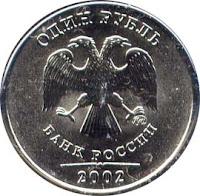
The ruble last year was considered by some foreign analysts and by the majority of Russian economists as a symbol of the revival of multi-currency domination and a rise of emerging market economies. The $600+ billion of foreign exchange reserves backing it made it seem invincible to many.
Yet the bleeding continues. With the major world economies slipping into official recession, Russia's once vast currency reserves continue to dwindle at a weekly pace. As Bloomberg reported today, the Russian Central Bank has reportedly sold around $7.5 billion in foreign currency reserves to prop up, or rather prepare a spiraling down of the ruble. It is now become the norm for the ruble's trading corridor to be expanded by around one percent each day.
The ruble is not technically kept as a free-floating currency, rather it is pegged to a euro-dollar basket, at almost 50/50, meaning the central bank intervenes to prop up the ruble only if the ruble is trading above or below determined range to the basket. Now, the expansion of the corridor for the past month has meant that the ruble has been deflating toward the euro-dollar basket at around 1% each day, and many analyst expect the total currency fall to be around 20-30% by year-end. The Central Bank could let the currency slide, but this may spiral out of control requiring the bank to intervene at a later date with a commitment to purchase rubles in the tens of billions of dollars/euros over the course of a few hours. This is why the weekly slide in reserves now totals over $5billion. Over a week this seems marginal, but multiply that by 50, and you see the reserves shrinking from over $449 billion last week to less than $200 by end of next year.
Russia has suffered an investment outflow from the economy of around $190 billion since August, a staggering amount which has resulted in the stock market fall by over 75%. The future does not look any brighter. The Russian government now positions itself as the sole provider of liquidity to Russian corporations which are being shunned by foreign creditors or at best are facing borrowing rates in excess of 12-15% in dollars (couple that with the ruble's deflation - the companies earn money predominantly in rubles and you face interest and repayment rates at close to 25%+). Over the past months the Russian government has already provided multi-billion dollar loans to Rosneft via its Vnesheconombank of $4.5 billion. It has also committed similar amounts to Sberbank and most other financial and industrial institutions.
Unfortunately there is a sour link in the equation of the Russian state funding Russian companies, it is the former. While it is true that many investors wonder why Russian companies are costing pennies right now, even if you price in a fall in commodity prices and weak import expectations from developed economies and India and China, it still does not on paper necessitate a 75% drop in value. The reason is that questions abound on the companies' funding source - the Russian government. With oil closing today at less than $50 (Brent) and Urals trading as usual below that, the Russian government will dip into its rainy-day fund next year to maintain a balanced budget. If this continues so rapidly, and unexpectedly (none of these assumptions seem to have been priced into Kudrin's planning models, which have been revised last week by a factor of two - down) Russia's reserves will run out by early or mid-2010 and it will have to actively borrow from creditors. As of now, Russia has the ability but not the need to borrow. It is a question if Russia decides to begin the process in 2009.
The Central Bank must be praying the world economy will turnaround. What the majority of analysts believed was an "island of stability" when the year 2008 began is now drawing the most pessimistic conclusions. As Putin said today commenting on the market downfall and noting the inability of the government's measures to overcome the nervousness and panic on global exchanges he called it an "ugly" and "unfair" measure. The Kremlin unusually finds itself dealing not with governments but with investors - major investors who are shorting Russia. It is a truly invisible front, and one which has taken major banks and a few economies into bankruptcy. The economy is Russia's concern for 2009, and the ruling elite better prioritize.










